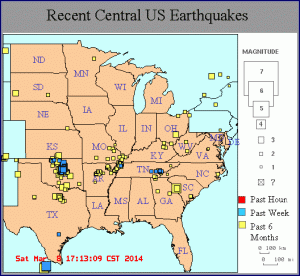![Image by Mikenorton (Own work) [CC-BY-SA-3.0 (http://creativecommons.org/licenses/by-sa/3.0)], via Wikimedia Commons](http://occupyworldwrites.org/wp-content/uploads/2014/01/1024px-HydroFrac-300x175.png)
Image by Mikenorton (Own work) [CC-BY-SA-3.0 (http://creativecommons.org/licenses/by-sa/3.0)], via Wikimedia Commons
We’ve covered this boom in seismic activity on numerous occasions. MNgranny’s articles When Science and Politics Collide, Corporations Win and The Town in Search of Truth tell the story of Azle, Texas. Since November 2013, at least 28 earthquakes with magnitudes between 2.1 and 3.7 have struck the area between Azle and Reno; an area that very rarely, if ever had earthquakes before last year.
Azle Mayor Alan Brundrette was one of the people to testify at the hearing. ““Our school district now conducts earthquake drills,” he said. He also told of cracking foundations and breaking water pipes in the town.
Arkansas and Ohio have both placed moratoriums on new injection wells in areas that have had recent unusual seismic activity. And in Oklahoma, the USGS recently released an earthquake warning for the state; the first ever for a state east of the Rockies. Oklahoma had 183 earthquakes of magnitude 3.0 or greater between October 2013 and April 14, 2014. Before then, the state would average two quakes of that size per year. And, since the fracking boom in Oklahoma started in 2009, the state’s had 20 quakes of 4.0 to 4.8 magnitude, as well as a 5.6 quake in the town of Prague on November 5, 2011. MNgranny discussed the Prague quake in Fracking Creates Quakes, NOT Cheaper Pump Prices! And, as a sign of how seriously Oklahoma residents are taking the recent upswing in seismic activity, 12 to 18 percent of residents now carry earthquake insurance, up from 2 to 4 percent in 2011.
So, how is Texas responding? Not so well. Researchers at Southern Methodist University are trying to gather information about injection well activity and the correlation to the increased seismic activity. However, the 12 new seismometers placed in the Azle region can’t create a full picture of what is going on underground without knowing the volumes and pressures of wastewater injections at each well. That information’s considered proprietary. As Mayor Brundrette put it; “We have a state agency that has the authority to regulate those operators, yet we can’t get everyone together to share the information we need to address the problem.”
The Texas Railroad Commission is the agency which oversees all gas and oil operations in the state, and their testimony implies that the state is in no hurry to act. Milton Rister, executive director of the Texas Railroad Commission, said “A knee-jerk reaction could have a negative impact on our economy because of the large role the oil and gas industry plays here… I think the three commissioners are aware we need to make some adjustment … but don’t want to do something we all end up regretting a year from now.”
Occupy World Writes on the other hand agrees with Lynda Stokes, the mayor of Reno, who said at the hearing; “The industry’s right to profit does not surpass our right as citizens to the quality of life we’ve come to know,”



![Photo by John Campbell (Verizon Camera phone) [FAL], via Wikimedia Commons](http://occupyworldwrites.org/wp-content/uploads/2014/01/Iron_Horse-196x300.jpg)